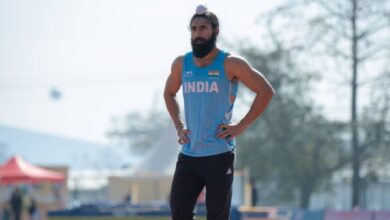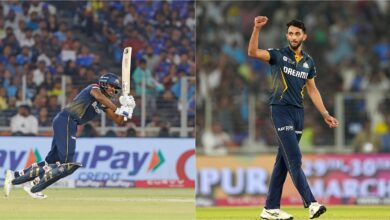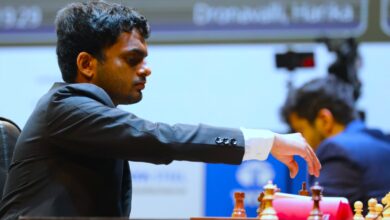Hardship & struggle make All England Badminton semifinal Treesa Jolly the player she is

You need to have stayed away from home and parents, gone through difficulties of getting food after missing hostel mess deadlines and felt deliriously grateful when some kindly lady offered to pack a tiffin for you sensing your struggle, to understand where Treesa Jolly’s appetite for a fighting win comes from.
We asked her about the metaphorical hunger to win, what fuels that tremendous energy when she stomps about the court and guides the shuttle with terrific angles across the net. Her reply blends her struggles on the court and many more off it.
“I moved from my village to Kannur city’s Mundayad to train at the University indoor courts at age 12. Alone. For badminton. Obviously, I missed my family, and fixing dinner every day after practice sessions was a struggle. But I had that fighting spirit inside me. I had to do this. I knew this was my long journey. If I lose, I have to come back and beat them,” she recalls of the three years after leaving her home in Pulingome village and before moving to Hyderabad at the age of around 15.
She had to move because her village had no indoor court to train on. Dr Anil Ramanathan, director of the Kannur University, would offer to let her train without coaching charges, but that meant moving out and staying away from home. It’s the three years in Kannur that Treesa says shaped her personality, and it’s a struggle memories of which she dips into – to tell herself that being on a badminton court facing a Top-10 opponent is nothing in comparison.
India’s Treesa Jolly with Gayatri Gopichand Pullela, return a shot to South Korea’s Baek Ha-na and Lee So-hee during their women’s double semi-final match in the All England Open Badminton Championships at the Utilita Arena in Birmingham, England. (AP | PTI)
“I rented a flat with 3-4 other players at Kannur because I couldn’t afford otherwise. I had to wash my own clothes in the beginning. Getting food used to be difficult. The university mess would give first access to their own physical education students. If we missed that short window, getting food anywhere else would become a problem in the evening. Staying out, not getting food, is one of the toughest experiences that have made me strong,” she says.
A young Treesa – in her early teens – also taught herself to ignore undercurrents of envy that can make hostel life hellish. “The other girls were seniors. I was playing better than most of them there, and they would get jealous. At that age, it was difficult because if I needed some help, I had to approach my seniors only. I told myself I don’t care, I’m so strong,” she recalls of the tricky days.
“It was a rollercoaster, but we’re extremely happy with our performance today.”
Another big win for the Indian WD pair 
— 

Sacrifices family
Besides, Kannur city had a wondrous wooden court, on which she had always dreamt of playing, as a child.
Treesa remembers her father making her and her ser an outdoor court to play on. He was a physical education teacher, who himself played badminton, volleyball and ran marathons. Both her parents taught in an unaided school, from where getting leave to travel with her for tournaments would become difficult, and her father would resign. “Because in the rainy season, it would become a mess, my dad made the first tarpaulin court so we wouldn’t miss a single session,” she says.
In her first state tournament, Treesa would win a singles silver. “That was the first time I saw a wooden court. I couldn’t even think of playing on a court like that, it was so shiny,” she recalls her wonder. “And then all these people came with hi-fi kits. But I won the doubles gold with my ser, Maria Jolly.”
Tournaments were the only time Treesa would play with feather shuttles. “I couldn’t afford them so it was plastic shuttles. I told myself anyway I need to win, plastic or feather shuttle, doesn’t matter. It couldn’t be an excuse.”
India’s Treesa Jolly with Gayatri Gopichand Pullela, prepare to return a shot to South Korea’s Baek Ha-na and Lee So-hee during their women’s double semi-final match in the All England Open Badminton Championships at the Utilita Arena in Birmingham, England. (AP | PTI)
The parents also had to choose between the two daughters to allow Treesa to go ahead with sport, because they could only afford one person’s equipment and coaching expenses, so Maria was asked to step back, though she continued playing badminton as a hob. “My father watched badminton and taught us variations and how to mix strokes. I had the natural talent for doubles and got results there, so I decided if I focus on that I can be the world’s best player,” she says with clarity.
While doubles as a serious pursuit has taken off in India only in recent years after Satwiksairaj Rankireddy and Chirag Shetty started logging in regular international victories, it was the Kerala environment which has always nurtured the discipline. “Kerala has had so many players – Aparna Balan, V Diju, Sanave (Thomas), Rupesh (Kumar). But more importantly, there are so many local tournaments where just doubles is played. No one will conduct singles meets. I remember before going for state tournaments, we would travel half an hour to play tournaments with these uncles in the age-bracket of 22-40. Me and my ser grew up competing against them, that’s how my game got its style,” she says. “We just love doubles in Kerala.”
She loved it enough to move out of home to Kannur City, and then later make the shift to Hyderabad.
Rising through the ranks
Picked for the national camp, Treesa’s earlier partners had been her ser Maria, then Mehereen Reeza, and later during the Dutch-German Open swing of tournaments, V S Varshini. Coaches at the national camp would pair her up with Gayatri Gopichand, as their games immediately complemented each other, and the pandemic lockdown would give her further clarity. “During the lockdown, we had Zoom sessions morning and evening. After 6-7 months, the academy opened and I realised I love playing doubles and I was enjoying the practice sessions,” she recalls.
India’s Treesa Jolly, right, and Gayatri Gopichand Pullela in action against China’s Li Wen Mei and Liu Xuan Xuan during day four of the YONEX All England Open Badminton Championships at the Utilita Arena Birmingham, England. ( AP | PTI)
Runners-up at the Syed Modi International, the unexpected march into the All England semis in 2022, beating two Top-20 pairings on the way, the Uber Cup last season, and then the Commonwealth Games, were followed stunning wins against Malaysian, Hong Kong and Chinese pairs at the Mixed Team Asian meet this year.
It helped that former doubles player Arun Vishnu had risen in the ranks to become a national level coach. “Especially with the language. I call him Chetaa, and I could directly tell him anything that was on my mind. During matches he keeps saying ‘adiki adi’ – I’m damn sure you will win’.”
Being a livewire on court also means she holds her resting hours precious. “No hobbies, after sessions I love to sleep,” she says. Playing the Nationals in Pune, the pairing would play two matches a day. “Rest is more important during tournaments,” she adds.
Treesa loves her movies and TV series and K-Pop though. “Alice in Borderland, it’s like Squid Games. That’s my latest favourite. But I like K-dramas – Crash Landing on You, It’s Ok to not be OK. Blackpink are my favourite K-Pop band, and I end up watching 2-3 movies after every tournament. Kaapa in Malayalam was the latest.”
We return to the original question during the interaction: what fuels her energy? “It’s not so much about Kerala food, I like many types of food. But my mother’s tapioca biryani and beef. And kappa biryani. But staying out when you are not getting food, and you struggle like I did in Kannur, you become grateful for any food you get when hungry.” You also get strong-willed and resilient like the 19-year-old youngster Treesa Jolly.







